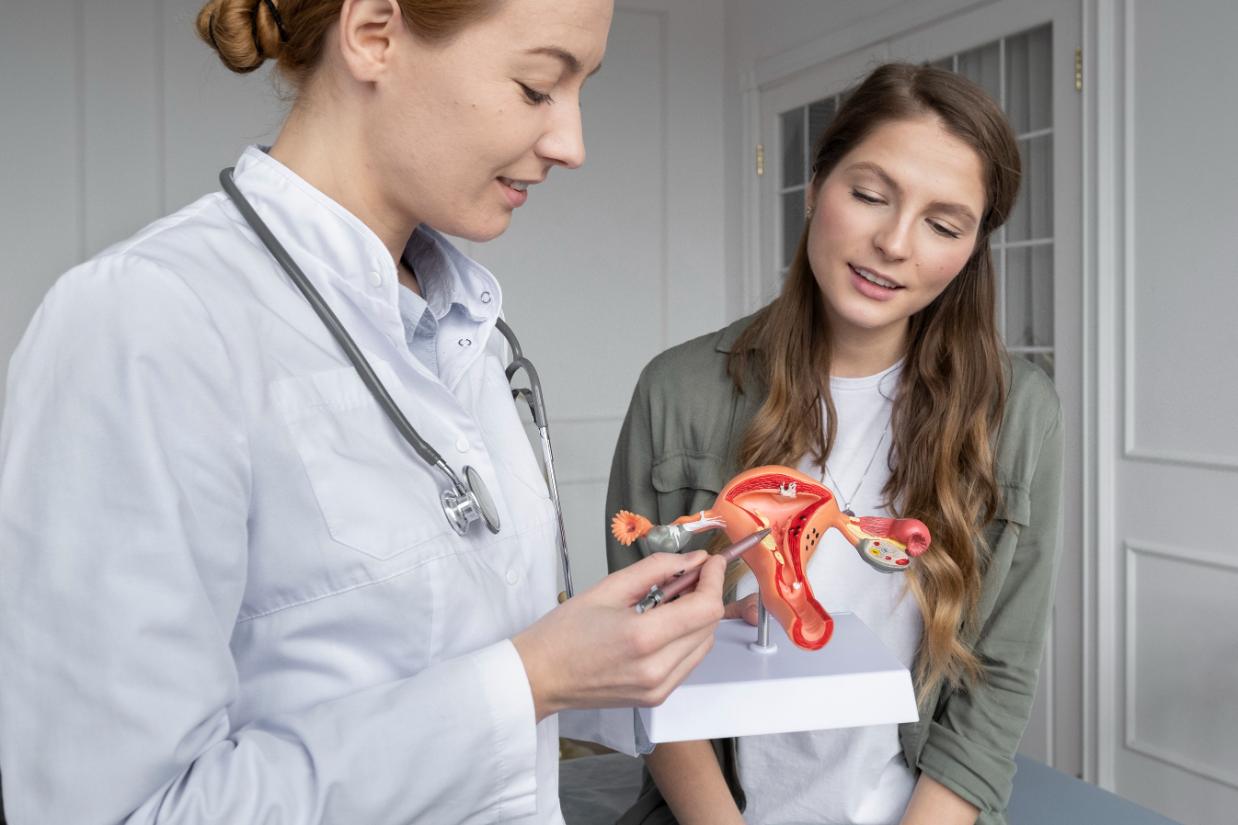Your thyroid plays a vital role in your fertility journey. Imbalances in thyroid hormones can disrupt ovulation and sperm production, impacting your ability to conceive. With hypothyroidism, you may face irregular periods and higher miscarriage risks, while hyperthyroidism can lead to birth defects and irregular cycles.
Simple blood tests can accurately diagnose thyroid dysfunction, guiding tailored treatment plans. Levothyroxine, a common treatment, restores hormone balance, promoting excellent fertility. Understanding these connections will empower you to make informed choices for your reproductive health. Further insights await on how to manage thyroid conditions for improved fertility outcomes.

If you have been diagnosed with a thyroid condition affecting your fertility, discussing levothyroxine treatment with your healthcare provider may be an important step towards improving your reproductive health.
Feel free to contact us for appointments and queries.
Mobile Phone No: 8921727906, 918547424080
Telephone Number: 0471- 2544706
Email: info@kjkhospital.com
What is the Thyroid?
Located in the front of your neck, the thyroid gland is a small endocrine gland that plays an essential role in your overall health by producing hormones that regulate metabolism. These hormones, triiodothyronine (T₃) and thyroxine (T₄), are important for various bodily functions. The thyroid gland works in coordination with the pituitary gland in your brain to maintain a delicate balance of thyroid hormones in your bloodstream. When your body needs more energy, the thyroid gland releases more hormones, which increase your metabolism. On the other hand, when energy demands decrease, hormone levels drop, slowing down your metabolism. This intricate dance is crucial for maintaining your energy levels, temperature regulation, and overall well-being. Understanding the basics of how your thyroid functions is the foundation for comprehending its impact on various aspects of your health, including fertility. By grasping the fundamental role of this gland, you can better appreciate how imbalances may affect your body’s ability to conceive.
The thyroid and fertility
Your understanding of how the thyroid gland functions lays the groundwork for recognizing its impact on fertility, particularly in relation to healthy ovulation and sperm production. The hormones produced by the thyroid play an important role in regulating metabolism, which directly influences the reproductive processes in both men and women. When there’s thyroid dysfunction, it can disrupt the delicate balance necessary for successful conception. For women, thyroid issues can lead to menstrual irregularities, making it harder to predict ovulation and time intercourse effectively for conception. Additionally, thyroid dysfunction in women may result in difficulties conceiving and increase the risk of early miscarriage. Men aren’t exempt from the effects of thyroid problems on fertility, as it can contribute to low sperm count and poor sperm quality, affecting the chances of fertilising an egg. Understanding how the thyroid impacts fertility is essential for those trying to conceive. Seeking medical advice and appropriate treatment for thyroid issues can greatly improve the chances of successful reproduction.Hypothyroidism VS Hyperthyroidism
Hyperthyroidism and hypothyroidism are two distinct conditions that can greatly impact fertility outcomes. Hyperthyroidism occurs when the thyroid gland produces an excess of thyroid hormones, potentially leading to irregular menstrual cycles and difficulties conceiving. This condition can also elevate the risk of birth defects in pregnancies. On the other hand, hypothyroidism arises when the thyroid gland doesn’t produce enough thyroid hormones, resulting in irregular periods and an increased likelihood of early miscarriage. Both hyperthyroidism and hypothyroidism can disrupt the delicate hormonal balance necessary for successful conception and a healthy pregnancy. Understanding the differences between these two conditions is essential as they require distinct management strategies. If you suspect you may have a thyroid issue, consulting with a healthcare provider for proper evaluation and treatment is vital to optimize your fertility health.How are thyroid dysfunctions diagnosed?
To diagnose thyroid dysfunctions, physicians typically conduct a simple blood test to measure T₃ and T₄ hormone levels. This test allows your physician to evaluate the functioning of your thyroid gland accurately. By analyzing the levels of these hormones in your blood, your healthcare provider can determine if your thyroid is overactive (hyperthyroidism) or underactive (hypothyroidism). The process involves a quick and straightforward blood draw, usually performed in a clinic or lab setting. Additionally, your physician may also check your thyroid-stimulating hormone (TSH) levels as part of the diagnostic process. TSH is a hormone produced by the pituitary gland that stimulates the thyroid to release T₃ and T₄. Abnormal TSH levels can indicate thyroid dysfunction, helping to confirm a diagnosis alongside T₃ and T₄ measurements. Being proactive about getting tested for thyroid dysfunctions can provide valuable insights into your reproductive health and fertility status. If you’re experiencing fertility issues, discussing thyroid testing with your healthcare provider is an important step towards understanding and potentially addressing any underlying thyroid-related concerns.Treating thyroid conditions related to fertility
Treatment options for thyroid conditions related to fertility include the use of synthetic thyroid hormones, such as levothyroxine. Levothyroxine is commonly prescribed to restore hormone balance in the body, which can enhance fertility for individuals with thyroid issues. Below is a table outlining some key points about levothyroxine treatment:| Levothyroxine Treatment | Description | Benefits |
| How it works | Synthetic thyroid hormone | Restores hormone balance |
| Administration | Oral medication | Easy to take |
| Dosage | Individualised based on levels | Precise treatment |
| Monitoring | Regular blood tests | Ensures optimal hormone levels |
| Impact on fertility | Improves chances of conception | Supports healthy pregnancy |





